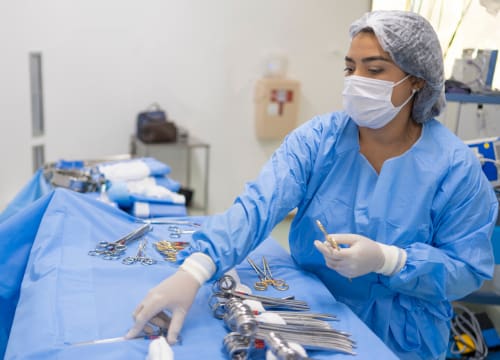The operating room (OR) is a high-stakes, collaborative environment where precision and teamwork are essential for successful surgeries. Each member of the surgical team plays a critical role in ensuring that procedures are performed safely and effectively. We will explore the different roles in an OR and how they work together for a successful surgery.
The Surgeon
The surgeon is the leader of the surgical team, responsible for performing the procedure. They make critical decisions during the operation and ensure that everything is proceeding as planned. Surgeons can specialize in various fields such as general surgery, orthopedic surgery, or neurosurgery, each requiring specific skills and expertise.
Interactions
- With Anesthesiologist: The surgeon and anesthesiologist collaborate closely to monitor the patient’s condition and adjust the procedure as needed. They communicate about the patient’s vital signs and any concerns that arise during the surgery.
- With Surgical Nurse: The surgeon relies on the surgical nurse for timely and accurate handling of instruments and supplies. The nurse also helps maintain a sterile field and assists in suturing and dressing wounds.
- With Surgical Technologist: The surgeon works directly with the surgical technologist, who anticipates the surgeon’s needs, provides instruments, and ensures the operative field remains sterile.

The Anesthesiologist
The anesthesiologist is in charge of administering anesthesia to the patient and monitoring their vital signs throughout the surgery. Their primary goal is to ensure the patient’s safety and comfort. This includes adjusting anesthesia levels as needed and managing pain before, during, and after the procedure.

Interactions
- With Surgeon: The anesthesiologist and surgeon work together to tailor the anesthesia plan to the specific needs of the surgery and the patient. Continuous communication ensures the patient’s stability and safety.
- With Surgical Nurse and Technologist: The anesthesiologist informs the surgical nurse and technologist of any changes in the patient’s condition that could affect the procedure. They coordinate patient positioning and monitoring equipment setup.
The Surgical Nurse
Surgical nurses play a crucial role in the OR by assisting the surgeon and ensuring that the surgical environment remains sterile. They handle instruments and supplies during the procedure and provide pre-op and post-op care. This includes preparing patients before surgery and offering care and instructions after surgery to aid in recovery.
Interactions
- With Surgeon: The surgical nurse assists the surgeon by passing instruments, sponges, and other supplies during the operation. They also help with tasks like suturing and applying dressings.
- With Anesthesiologist: The surgical nurse works with the anesthesiologist to monitor the patient’s condition, ensuring all necessary equipment is in place and functioning.
- With Surgical Technologist: The surgical nurse and technologist work together to set up the OR, prepare instruments, and maintain sterility throughout the procedure. They coordinate tasks to ensure everything runs smoothly.

The Surgical Technologist
Surgical technologists, also known as scrub techs, are integral members of the surgical team. Their responsibilities span before, during, and after surgery, making them essential to the smooth operation of the OR.
Before surgery, surgical technologists prepare the OR by sterilizing equipment and setting up instruments. They ensure that all necessary supplies are available and organized for the procedure. During surgery, they hand instruments to the surgeon, maintain a sterile environment, and anticipate the needs of the surgical team. After surgery, they clean the OR, account for all instruments, and prepare the room for the next procedure.

Interactions
- With Surgeon: The surgical technologist works closely with the surgeon, anticipating their needs and providing instruments and supplies promptly. They ensure the surgical field remains sterile, allowing the surgeon to focus on the procedure.
- With Anesthesiologist: The surgical technologist collaborates with the anesthesiologist to ensure all necessary monitoring equipment is set up and functioning. They assist in patient positioning and help manage any equipment adjustments needed during the surgery.
- With Surgical Nurse: The surgical technologist and surgical nurse work as a team to prepare the OR, handle instruments, and maintain sterility. They coordinate their efforts to ensure that all surgical supplies are available and organized, supporting the surgeon effectively.
- With Other OR Staff: The surgical technologist interacts with the circulating nurse and OR coordinator to ensure that all equipment and supplies are available while promptly addressing any issues. They play a key role in maintaining communication and efficiency within the OR.
The role of the surgical technologist is vital in coordinating the surgical team and equipment. They act as a crucial link between all members of the surgical team, ensuring that everything runs smoothly and efficiently. Their attention to detail and organizational skills are key to the success of any surgical procedure.
Other Key Members
Other essential members of the OR team include:
- Circulating Nurse: This nurse moves in and out of the OR to bring necessary items, help maintain records, and assist with any needs that arise during the surgery.
- Surgical Assistant: They assist the surgeon more directly, sometimes performing parts of the procedure under the surgeon’s supervision.
- OR Coordinator: This person manages schedules and ensures that all necessary supplies and equipment are available for surgeries.
Final Thoughts
In summary, the operating room is a dynamic and collaborative environment where each team member plays a critical role. The surgeon, anesthesiologist, surgical nurse, and other key members work together to ensure successful surgical outcomes. Among them, the surgical technologist stands out for their unique and essential contributions to the surgical team. They coordinate the surgical team and equipment, making sure everything runs smoothly.
If you are considering a career in the medical field, becoming a surgical technologist is a rewarding and vital role. With proper training and dedication, you can become an integral part of the surgical team, contributing to the success of life-saving procedures.

